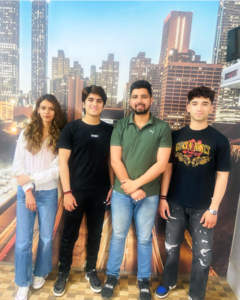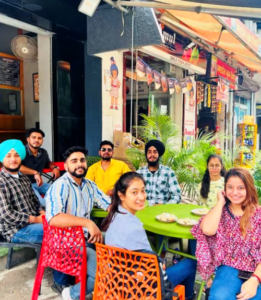Section 1:The Medicine
Questions 1-4: YES, NO, NOT GIVEN:
In this type of question, candidates are asked to find out whether:
The statement in the question matches with the claim of the writer in the text- YES
The statement in the question contradicts with the claim of the writer in the text- NO
The statement in the question has no clear connection with the account in the text- NOT GIVEN
[TIPS: For this type of question, you can divide each statement into three independent pieces and make your way through with the answer.]
Question 1: You should lie down after you have taken the medicine.
Keywords for this question: should lie down, after, taken the medicine,
Take a look at the first point in ‘Instructions’ section. The author of the text says here,
- Do not take this medicine on an empty stomach or immediately before lying down.
This means the medicine can cause harm if someone lies down after taking it.
So, the answers are: NO
Question 2: You must stop taking the medicine if your eyesight is affected.
Keywords for this question: must stop, taking, medicine, if, eyesight, affected,
Again, take a look at the second point in ‘Instructions’ section. The author of the text says here,
- If any of the following occur, discontinue taking the medicine and contact your doctor: dizziness, vomiting, blurred vision.
Here, discontinue taking = must stop taking, blurred vision = eyesight is affected,
So, the answer is: YES
Question 3: You must stop taking the medicine when you feel better.
Keywords for this question: must stop, taking, medicine, when, feel better,
In the fourth point of the ‘Instructions’ section, the writer says,
- Once you have begun to take this medicine, you must continue to take it until the bottle is empty, unless advised otherwise by your doctor.
So, the answer is: NO
Question 4: This medicine is suitable for a person of any age.
Keywords for this question: medicine, suitable, person, any age,
Have a look at the third point in the ‘Instructions’ section,
- This medicine is not available without a prescription and is not suitable for children under 5 years.
So, the answer is: NO
IMPORTANT NOTICE: PRODUCT RETURN
Questions 5-9: Short answer to open questions
[In this kind of questions candidates have to answer some questions, only with some conditions like NO MORE THAN THREE/TWO WORDS and/or A NUMBER or, ONE WORD ONLY. Each question has keywords which will lead to the answer. This question type generally follows a sequence.]
Question 5: Where can you find the batch number on the jars?
Keywords for this question: where, batch number, on, jars,
Have a look at the first paragraph. The last line says, “ . .. . The batch number is printed on the bottom of each jar.”
So, the answer is: (on the) bottom (of jar)
Question 6: How much will you receive for an opened jar of contaminated Chicken Curry?
Keywords for this question: how much, receive, opened jar, contaminated Chicken Curry,
Take a close look at the second paragraph. Here, the writer says in the last lines, “ . .. . . Fancy Foods will pay $10 for each jar returned unopened and $5 for each jar already opened.”
So, the answer is: $5 / five dollars
Question 7: If you have eaten Chicken Curry from a jar with one of the batch numbers listed, whom should you contact?
Keywords for this question: if, eaten, Chicken Curry, jar with, one of the batch numbers listed, whom, contact,
In the third paragraph, the author of the text says in lines 2-3, “ . .. . However, the company’s Retailing Manager will be interested to hear from people who have consumed chicken curry from any of the above batch numbers.”
Here, have consumed chicken curry = have eaten Chicken Curry,
So, the answer is: (company’s) retailing manager
Question 8:What information do they ask you to provide about the jar of Chicken Curry you ate?
Keywords for this question: information, ask, to provide, about, jar of Chicken Curry, ate,
In third paragraph the last lines say, “ . .. . In particular, it will be helpful if they can give information about the place of purchase of the product.”
So, the answer is: place of purchase
Question 9: What is the maximum reward Fancy Foods is offering for information about who contaminated their product?
Keywords for this question: maximum reward, Fancy Foods, offering, information, who, contaminated, product,
The ‘REWARD’ section of the text has the answer. The writer says here in the beginning, “Fancy Foods will pay a reward of $10,000 to $50,000 for information which leads to the conviction of any person found guilty of placing metal pieces in its products. … …”
Here, the highest/ maximum range of the reward is $50,000.
So, the answer is: $50,000
FABULOUS FURNITURE
Questions 10-13: List of headings
[In this question type, IELTS candidates are provided with a list of headings, usually identified with lower-case Roman numerals (i, ii, iii, etc,). A heading will refer to the main idea of the paragraph or section of the text. Candidates must find out the equivalent heading to the correct paragraphs or sections, which are marked with alphabets A, B, C and so forth. Candidates need to write the appropriate Roman numerals in the boxes on their answer sheets. There will always be two or three more headings than there are paragraphs or sections. So, some of the headings will not be used. It is also likely that some paragraphs or sections may not be included in the task. Generally, the first paragraph is an example paragraph which will be done for the candidates for their understanding of the task.
Tips to answer this question: Don’t read the list of headings first. Have a quick look at the questions, and go straight to the first question and start reading the paragraph associated with it. Skimming is the best reading technique. You need not understand every word here. Just try to gather the gist of the sentences. That’s all. Read quickly, and don’t stop until you finish each sentence.]
Question 10: Section C
Let’s have a look at section C. The writer says here, “Unlike most cards, the Fabulous Furniture Credit Card offers a full 60-day interest-free period on every Fabulous purchase – no matter when you make your purchase. This leaves you with more money to spend on other things.”
Here, interest-free = save money by not paying interest,
So, the answer is: ii (Save money by not paying interest)
Question 11: Section D
In section D, there are two points and both points talk about payment options.
- You may choose to pay the full amount within 60 days. In this case, you pay no interest.
- You may spread your payments over a longer period. In this case, interest will be charged after the initial 60-day interest-free period.
So, the answer is: i (Payment options)
Question 12: Section E
Section E talks about applying for a card. “Application is absolutely free! Nor are there any annual fees or administration fees. Just fill in the application form and bring it to your nearest Fabulous Furniture store. Your application will be processed promptly and you can begin making purchases immediately after your application is approved.”
So the answer is: vi (Applying for a card)
Question 13: Section F
In section F, locations of different Fabulous Furniture stores have been explained, “We have stores in every major city, so you’re never far away from a Fabulous Furniture store. For our addresses, just check in your local telephone directory.”
So the answer is: v (Location of stores)
Section 2:STUDENT CLUBS AND SOCIETIES
Questions 14-17: List of headings
[In this question type, IELTS candidates are provided with a list of headings, usually identified with lower-case Roman numerals (i, ii, iii, etc,). A heading will refer to the main idea of the paragraph or section of the text. Candidates must find out the equivalent heading to the correct paragraphs or sections, which are marked with alphabets A, B, C and so forth. Candidates need to write the appropriate Roman numerals in the boxes on their answer sheets. There will always be two or three more headings than there are paragraphs or sections. So, some of the headings will not be used. It is also likely that some paragraphs or sections may not be included in the task. Generally, the first paragraph is an example paragraph which will be done for the candidates for their understanding of the task.
Tips to answer this question: Don’t read the list of headings first. Have a quick look at the questions, and go straight to the first question and start reading the paragraph associated with it. Skimming is the best reading technique. You need not understand every word here. Just try to gather the gist of the sentences. That’s all. Read quickly, and don’t stop until you finish each sentence.]
Question 14: Paragraph A
Have a look at the first few lines of Paragraph A, “This club was first started by a group of friends who enjoyed going to the cinema. When our trips became more frequent we realised that there must be others who also shared our love of movies. .. .. .”
Here, cinema = films, shared our love of movies = film appreciation,
So the answer is: iii (Film Appreciation Society)
Question 15: Paragraph B
The first and last lines have the answer for this question, “The association has many opportunities to debate and we are a non-political unbiased international organisation . . . .. . .. Our plans this year include discussion groups, guest speakers and to build a model of the UN General Assembly.”
Here, non-political unbiased international organisation = United Nations,
So, the answer is: ix (United Nations Student Club)
Question 16: Paragraph C
The first 3 lines of paragraph C have the answer, “Whether for fun or debating experience, we discuss everything from personal experience, future society or feminism. This year we plan an internal competition, weekly debates and beginners’ lessons as well as chances to compete nationally. .. .. .”
So, the answer is: viii (Debating Club)
Question 17: Paragraph D
Lines 2-3 of paragraph D say, “ . . .. . On the other hand, want to work really hard for great rewards? Then come and join the club where interesting theatre is created. .. . .”
Here, theatre = drama,
So, the answer is: iv (Drama Society)
Questions 18-19: Short answer to open questions
[In this kind of questions candidates have to answer some questions, only with some conditions like NO MORE THAN THREE/TWO WORDS and/or A NUMBER or, ONE WORD ONLY. Each question has keywords which will lead to the answer. This question type generally follows a sequence.]
Question 18: How do you let the CAS President know you are interested in joining a club?
Keywords for this question: how, let, CAS President, know, interested, joining a club,
Take a look at the bottom of the notice. The writer of the text says here, “If you are interested in joining any of these clubs, you can leave a message for the President at the CAS Office in the Student Union Building. .. .. ..”
So, the answer is: leave (a) message
Question 19: How often is the CAS Ball held?
Keywords for this question: how often, CAS Ball, held,
At the bottom of the notice, take a look at lines 3-4, “ … …. . And don’t forget the CAS Ball is an annual event!
This year it’s being held on 22 December!”
Here, Early Childhood Nursing program = infant illness,
So, the answer is: annually / once a year / every year / each year
Student Loans
Questions 20-27: YES, NO, NOT GIVEN:
In this type of question, candidates are asked to find out whether:
The statement in the question matches with the claim of the writer in the text- YES
The statement in the question contradicts with the claim of the writer in the text- NO
The statement in the question has no clear connection with the account in the text- NOT GIVEN
[TIPS: For this type of question, you can divide each statement into three independent pieces and make your way through with the answer.]
Question 20: I’m taking a month’s cookery course at a local college. It’s a private catering college. I’m going a couple of evenings a week, after work. I get a diploma at the end of it. Can I get some help with a student loan?
Keywords for this question: a month’s cookery course, private catering college, a couple of evenings a week, after work, get, diploma, at the end, some help with, student loan,
In the ‘Eligibility’ section, take a look at the second paragraph. Here, the writer says, “Eligible courses are offered by colleges, universities, the Scottish grant-aided colleges and other publicly funded institutions providing Higher Education courses.”
Here, these lines suggest that you can only apply for a student loan if you are studying in a publicly funded institution, NOT private institution.
So, the answer is: NO
Question 21: I’m starting a foundation course in September. It’s full time and after a year I hope to get on to a degree course. The fees for the actual course are being paid for by my Local Authority. Am I eligible for a student loan?
Keywords for this question: a foundation course, September, full time, after a year, get, a degree course, fees, actual course, being paid for, by, Local Authority, eligible for, student loan,
In the third paragraph of the ‘Eligibility’ section, the writer says, “In general, eligible courses include first degree courses or their equivalents and any other courses for which your Local Authority will pay your tuition fees.”
So, the answer is: YES
Question 22: I finish my first degree in July. I’ve got a place on a Postgraduate Certificate in Education course to start in September. Will the Local Authority pay the tuition fees for this course?
Keywords for this question: finish, first degree, July, got, place on, Postgraduate Certificate in Education course, start, September, Local Authority, pay, tuition fees, for this course,
In the third paragraph of the ‘Eligibility’ section, we find the information about getting loan if the Local Authority pays for the tuition fees. However, there is NO information on whether the Local Authority will pay the tuition fees for any Postgraduate Certificate in Education Course.
So, the answer is: NOT GIVEN
Question 23: Now all her children are grown up my mother says she’d like to finish the studies she was forced to give up earlier in life. She’s 48 now and her course is full-time for a year. Is she too old to get a student loan?
Keywords for this question: all children, grown up, mother, like to, finish, studies, was forced to give up, earlier in life, 48, course full-time, year, too old, get, student loan,
In the ‘Eligibility’ section, the first paragraph gives us the answer to this question. Here, look at these lines, “ . . .. . You are eligible for a student loan if you are a UK resident and are attending a full-time Higher Education course, below postgraduate level, or a Postgraduate Certificate in Education course, provided you start your course before your 50th birthday. .. … ..”
Here, provided you start your course before your 50th birthday means you are eligible for a student loan if you start your course before the age of 50.
So, the answer is: NO
Question 24: I’ve already been given a small scholarship to cover some of my tuition fees. Can I still get a student loan?
Keywords for this question: already been given, small scholarship, to cover, tuition fees, get, student loan,
In the ‘Your financial circumstances’ section, take a close look at point no. 1,
- The amount of your maintenance grant or tuition fees does not matter.
This means you will still be eligible for a student loan if you have already got any grant or scholarship.
So, the answer is: YES
Question 25: I’m actually staying with my aunt while I’m at college. Will the Student Loans Company want to know how much she earns?
Keywords for this question: staying, with, aunt, while, at, college, Student Loans Company, want to know, how much, she earns,
Again, in the ‘Your financial circumstances’ section, take a look at point no. 4,
- The income of your parents, spouse, partner or other relatives is not taken into account.
So, the answer is: NO
Question 26: I owed the bank rather a lot of money a few years ago. It’s all paid back now but they won’t lend me anymore. Will this disqualify me from getting a student loan?
Keywords for this question: owed, bank, a lot of money, few years ago, all paid back now, but, won’t lend me, anymore, disqualify, from getting, student loan,
Again, in the ‘Your financial circumstances’ section, take a look at point no. 5,
- Your previous financial record is not a consideration.
This means having a past financial record does not disqualify you from getting a student loan.
So, the answer is: NO
Question 27: I took a course a couple of years ago, got a student loan, but had to withdraw half-way through. I’ve kept up all my payments on my loan. Am I eligible for a second loan?
Keywords for this question: took, course, couple of years ago, got, student loan, but, had to withdraw, half-way through, kept up, all, payments, my loan, eligible for, second loan,
Again, in the ‘Your financial circumstances’ section, take a look at point no. 3,
- Any previous student loans are not taken into account.
So, the answer is: YES
Section 3:FIRST IMPRESSIONS COUNT
Questions 28-33: Identifying information:
[This question asks you to find information from the passage and write the number of the paragraph (A, B, C or D … .. ) in the answer sheet. Now, if the question is given in the very first part of the question set, I’d request you not to answer them. It’s mainly because this question will not follow any sequence, and so it will surely kill your time. Rather, you should answer all the other questions first. And just like List of Headings, only read the first two lines or last two lines of the expected paragraph initially. If you find the answers, you need not read the middle part. If you don’t find answers yet, you can skim the middle part of the paragraph. Keywords will be a useful matter here.]
Question 28: different types of purchasing agreement
Keywords for this question: different types, purchasing agreement,
In paragraph F lines 5-8 describes different types of purchasing agreement, “ . .. . . which means they offer a total service to put together the whole complex operation of a company’s corporate clothing package – which includes reliable sourcing, managing the inventory, budget control and distribution to either central locations or to each staff member individually. .. .. .”
So, the answer is: F
Question 29: the original purposes of uniforms
Keywords for this question: original purpose, uniforms,
Take a look at the first few lines of paragraph A that explains the original purposes of uniforms, “Traditionally uniforms were — and for some industries still are — manufactured to protect the worker. When they were first designed, it is also likely that all uniforms made symbolic sense – . . . .. .”
Here, protect the worker & symbolic sense = original purposes,
So, the answer is: A
Question 30: the popularity rating of staff uniforms
Keywords for this question: popularity rating, staff uniforms,
The final lines of paragraph G say, “ . .. . . A recent survey of staff found that 90 per cent welcomed having clothing which reflected the corporate identity.”
Here, 90 per cent welcomed = popularity rating, clothing = staff uniforms,
So, the answer is: G
Question 31: involving employees in the selection of a uniform
Keywords for this question: involving, employees, selection, uniform,
In paragraph E, have a look at lines 2-3, “ . . .. . Giving the wearers a choice has become a key element in the way corporate clothing is introduced and managed. .. … ..”
Here, Giving the wearers a choice = involving employees in the selection,
So, the answer is: E
Question 32: the changing significance of company uniforms
Keywords for this question: changing significance, company uniforms,
In paragraph B, take a look at these lines, “ . .. . . The result is a new way of looking at corporate workwear. From being a simple means of identifying who is a member of staff, the uniform is emerging as a new channel of marketing communication.”
Here, a new way of looking = changing significance, corporate workwear = company uniforms,
So, the answer is: B
Question 33: perceptions of different types of dress
Keywords for this question: perceptions, different types of dress,
In paragraph C, have a look these lines in the middle of the paragraph, “ . . . . . Dark colours give an aura of authority while lighter pastel shades suggest approachability. Certain dress style creates a sense of conservatism, others a sense of openness to new ideas. . . . … ..”
Here, the lines suggest different perceptions, or, opinions about different types of dress.
So, the answer is: C
Questions 34-40: YES, NO, NOT GIVEN:
In this type of question, candidates are asked to find out whether:
The statement in the question matches with the claim of the writer in the text- YESThe statement in the question contradicts with the claim of the writer in the text- NOThe statement in the question has no clear connection with the account in the text- NOT GIVEN
[TIPS: For this type of question, you can divide each statement into three independent pieces and make your way through with the answer.]
Question 34: Uniforms were more carefully made in the past than they are today.
Keywords for this question: more carefully made, past, than, today
We do not find any information on the comparison past and present ways of making uniforms carefully.
So, the answer is: NOT GIVEN
Question 35: Uniforms make employees feel part of a team.
Keywords for this question: make, employees, feel, part of a team,
The final few lines of paragraph B talk about uniforms making people feel part of a team. Here, the writer says, “. .. … .. The result is a new way of looking at corporate workwear. From being a simple means of identifying who is a member of staff, the uniform is emerging as a new channel of marketing communication.”
Here, being a simple means of identifying who is a member of staff = uniforms make employees feel part of a team,
So, the answer is: YES
Question 36: Using uniforms as a marketing tool requires great care.
Keywords for this question: using uniforms, marketing tool, requires, great care,
The very first line of paragraph C says, “Truly effective marketing through visual cues such as uniforms is a subtle art, . .. ..”
Here, subtle art = an art that requires great care and attention,
So, the answer is: YES
Question 37: Being too smart could have a negative impact on customers.
Keywords for this question: being too smart, negative impact, customers,
Again, in paragraph C lines 5-6 say, “ . .. . Neatness can suggest efficiency but, if it is overdone, it can spill over and indicate an obsession with power. .. .. .”
Here, Neatness = smartness, overdone = being too smart, spill over and indicate an obsession with power = negative impact on customers,
So, the answer is: YES
Question 38: Most businesses that supply company clothing are successful.
Keywords for this question: most businesses, supply, company clothing, successful,
The first lines of paragraph D say, “But translating corporate philosophies into the right mix of colour, style, degree of branding and uniformity can be a fraught process. And it is not always successful. .. .. .”
Here, translating corporate philosophies into the right mix = making companies successful, fraught process = burdened process,
So, the answer is: NO
Question 39: Uniforms are best selected by marketing consultants.
Keywords for this question: uniforms, best selected, marketing consultants,
There is NO such information about uniforms being best selected by marketing consultants.
So, the answer is: NOT GIVEN
Question 40: Clothing companies are planning to offer financial services in the future.
Keywords for this question: clothing companies, planning, offer, financial services, future,
In the final paragraph (paragraph G), the first lines say, “Corporate clothing does have potential for further growth. Some banks have yet to introduce a full corporate look; .. .. .”
Here, some banks = some financial companies, yet to introduce a full corporate look = offer clothing services in the future,
So, the answer is: NO








